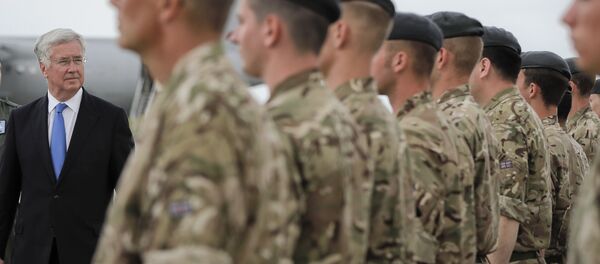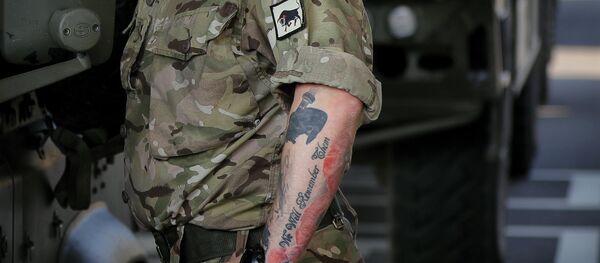Official figures show around 40 planes from NATO Member States have been flown in to police UK seas, with the US dispatching aircraft to RAF Lossiemouth, Scotland 20 times, while Canada sent planes on eight occasions. A further five were sent from Germany and France apiece, while Norway lent one.
Until 2010, the UK's own Nimrod spy planes would've been used, but in 2010 David Cameron's government axed the US$5.4 billion (£4.1 billion) fleet following a defense spending review, in order to save US$2.6 billion (£2 billion) over 10 years. Then-Defense Minister Gerard Howarth has since said the move was a "folly" and left the UK "exposed" to threats from other countries.
A Ministry of Defense spokesperson said the number of flights carried out by NATO allies on the RAF's behalf in 2017 was down on 2015, and the operations were part of the UK's commitment to working closely with its NATO allies in the North Atlantic.
The UK may not be without spy plane capabilities of its own for very long. In 2016, it was announced the Royal Air Force would add nine Boeing P-8 Poseidons to its arsenal. The planes have the capacity to deliver GCHQ-style intelligence gathering, with the ability to hack terrorists' communications and track their movements.
Overnight US news — latest $2.2bn Lot 8 contract for 17 x Boeing P-8 Poseidons also incl first 2 P-8As for UK, for delivery in 2019 #avgeek pic.twitter.com/8qsLnqo2ja
— Tim Robinson (@RAeSTimR) April 4, 2017
While the news will no doubt many shock UK citizens, in truth the UK has ever-increasingly relied on military and intelligence support from other nations since World War II due to budgetary cuts. Most commonly, the US has been relied upon, both generally and in specific circumstances. For prominently, the UK's constantly declining navy (as of July 2017, it possesses its fleet runs to a mere 89 ships) has managed to retain its "blue water" capabilities thanks to US air cover — and its total lack of jet fighter support (its last Harriers were decommissioned in 2010), meant that in 2011, the country was compelled to borrow planes from the US to protect Royal Navy warships fighting in Libya.
In the Falklands War, despite contemporaneous official denials, the US provided satellite and signals intelligence, Sidewinder air-to-air missiles and Stinger hand-held missiles and fueled to the British Task Force and aircraft at the mid-Atlantic staging post of the Ascension Island military base, which is leased to the US by the UK.
Moreover, that the UK's "independent" nuclear deterrent, Trident, is in fact not independent is one of the worst kept secrets in international politics. A 2014 cross-party parliamentary investigation starkly underlined this uncomfortable fact, noting the weapon was a "hostage to American goodwill" (the report said it was "difficult to conceive of any situation in which a Prime Minister would fire Trident without prior US approval") and was retained by the UK largely in order to "maintain the facade" of being a global military power.
UK'S TRIDENT SYSTEM NOT TRULY INDEPENDENT House of Commons — Defence — Written Evidence https://t.co/08yVirzH9g
— See (@EndtheWar2017) April 24, 2017
It's not merely in military equipment that the UK is lacking. UK army personnel statistics published in July showed the number of fully trained soldiers in its ranks has dropped below a previous "trained strength" target of 82,000 to 78,010 — a shortfall of 3,990 fully trained troops, and the lowest total since the 18th century. Critics say the country's military faces a "potentially very, very dangerous crisis" as a result.
UK Armed Forces Service Personnel Statistics at 1 Jun 2017 #MODstats published today: https://t.co/v3YePdaYDx
— Ministry of Defence (@DefenceHQ) July 20, 2017
Despite these gaping deficits, the UK remains a top 10 defense spender, largely due to its ongoing investment in high tech equipment and associated capabilities. Nonetheless, earlier that month, the Royal United Services Institute published a report that found UK defense tech was vulnerable to low-cost, technology-rich weapons employed by other states.
New @RUSI_org report: Defence #Innovation & the UK: Responding to the Risks Identified by the US 3rd Offset Strategy https://t.co/JpmL8vfEu8
— RUSI (@RUSI_org) July 11, 2017
As a result, RUSI concluded the UK government should commit to research, innovation and adaptive technologies for genuine defense, rather than force projection. In short, the UK must ditch its pretense of being a major military player in the international sphere, and stop pumping money into potentially useless weapons.






